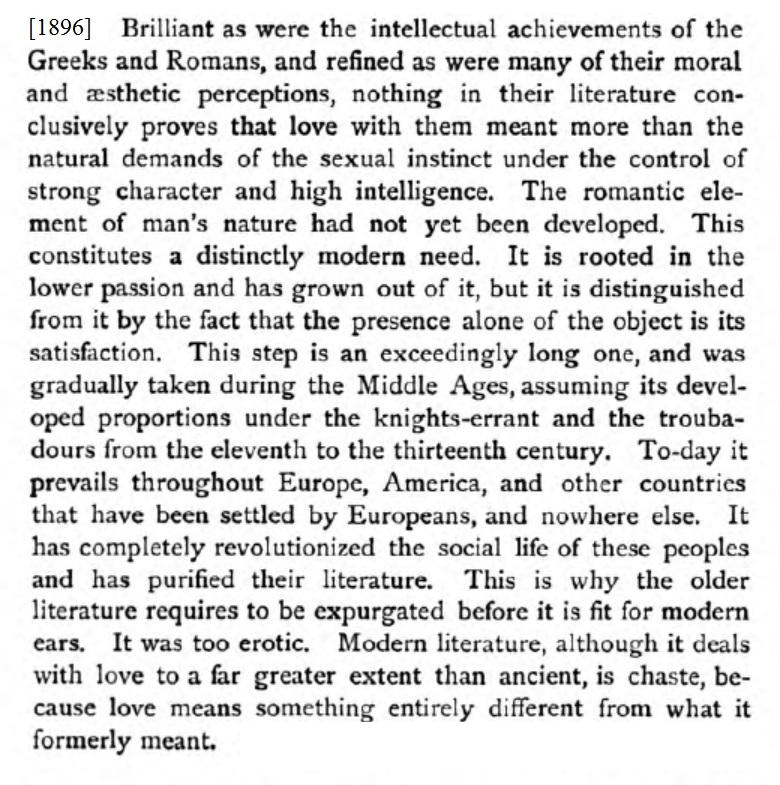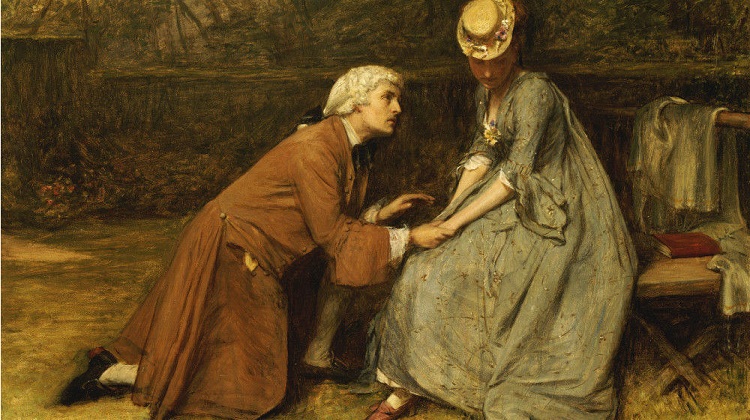The following essay is from the book Pure Sociology by Lester F. Ward 1903 [pp. 390-403] – PW
Romantic Love
It is the psycho-physiological progress going on in all races that have undergone repeated and compound social assimilation, that has laid the foundation for the appearance (in the most advanced races) of a derivative form of natural love which is known as romantic love.
It is a comparatively modern product, and is not universal among highly assimilated races. In fact, I am convinced that it is practically confined to what is generally understood as the Aryan race, or, at most, to the so-called Europeans, whether actually in Europe or whether in Australia, America, India, or any other part of the globe. Further, it did not appear in a perceptible form even in that ethnic stock until some time during the Middle Ages.
Although I have held this opinion much longer, I first expressed it in 1896.1 It is curious that since that time two books have appeared devoted in whole or in part to sustaining this view.2 There is certainly no sign of the derivative sentiment among savages. Monteiro, speaking of the polygamous peoples of Western Africa, says: –
The negro knows not love, affection, or jealousy. … In all the long years I have been in Africa I have never seen a negro manifest the least tenderness for or to a negress. … I have never seen a negro put his arm round a woman’s waist, or give or receive any caress whatever that would indicate the slightest loving regard or affection on either side. They have no words or expressions in their language indicative of affection or love.3
Lichtenstein4 says of the Koossas: “To the feeling of a chaste tender passion, founded on reciprocal esteem, and an union of heart and sentiment, they seem entire strangers.“ Eyre reports the same general condition of things among the natives of Australia,5 and it would not be difficult to find statements to the same effect relative to savage and barbaric races in all countries where they have been made the subject of critical study.
Certainly all the romances of such races that have been written do but reflect the sentiments of their writers, and are worthless from any scientific point of view. This is probably also the case for stories whose plot is laid in Asia, even in India, and the Chinese and Japanese seem to have none of the romantic ideas of the West; otherwise female virtue would not be a relative term, as it is in those countries. This much will probably be admitted by all who understand what I mean by romantic love.
The point of dispute is therefore apparently narrowed down to the question whether the Ancient Greeks and Romans had developed this sentiment. I would maintain the negative of this question. If I have read my Homer, Æschylus, Virgil, and Horace to any purpose they do not reveal the existence in Ancient Greece and Rome of the sentiment of romantic love.
If it be said that they contain the rudiments of it and foreshadow it to some extent I shall not dispute this, but natural love everywhere does this, and that is therefore not the question. The only place where one finds clear indications of the sentiment is in such books as “Quo Vadis,” which cannot free themselves from such anachronisms.
I would therefore adhere to the statement made in 1896, when I said, “Brilliant as were the intellectual achievements of the Greeks and Romans, and refined as were many of their moral and esthetic perceptions, nothing in their literature conclusively proves that love with them meant more than the natural demands of the sexual instinct under the control of strong character and high intelligence. The romantic element of man’s nature had not yet been developed.”
The Greeks, of course, distinguished several kinds of love, and by different words (????, ?????, ?????), but only one of these is sexual at all. For ???? they often used ‘A???????. They also expressed certain degrees and qualities in these by adjectives, e.g., ????????. Some modern writers place the adjective ???????? over against ????????, as indicating that they recognized a sublimated, heavenly, or spiritual form of sexual love, but I have not found this in classic Greek.
Neither do I find any other to the Latin Venus vulgivaga. But whether such softened expressions are really to be found in classic Greek and Latin authors or not, the fact that they are so rare sufficiently indicates that the conceptions they convey could not have been current in the Greek and Roman mind, and must have been confined to a few rare natures.
Romantic love is therefore not only confined to the historic races, those mentioned in Chapter III as representing the accumulated energies of all the past and the highest human achievement, but it is limited to the last nine or ten centuries of the history of those races.
It began to manifest itself some time in the eleventh century of the Christian era, and was closely connected with the origin of chivalry under the feudal system. Guizot has given us perhaps the best presentation of that institution,6 and from this it is easy to see how the conditions favored its development.
REFERENCES
[1] International Journal of Ethics, Vol. VI, July, 1896, p. 453. [click thumbnail]

[2] “Antimachus of Colophon and the Position of Women in Greek Poetry,” by E. F. M. Benecke, London, 1896. “Primitive Love and Love Stories,” by Henry T. Finck, New York, 1899.
[3] “Angola and the River Congo,” by Joachim John Monteiro. In two volumes. London, 1875, Vol. I, pp. 242-243.
[4] “Travels in Southern Africa,” in the years 1803, 1804, 1805, and 1806, by Henry Lichtenstein, English translation, Dublin, 1812, p. 261.
[5] Journals, etc., Vol. II, p. 321.
[6] “Histoire de la Civilisation en France depuis la chute de I’Empire Romain,” par M. Guizot, 3e éd., Vol. III, Paris, 1840, Sixième Leçon, pp. 351-382.

Brilliant selection to highlight the rise of chivalry and the onset of the concept of romance.
By the way, prior to the 11th century or so, churches were named after the (male) disciples and Mary was restricted to a much lesser role, theologically, than she later attained. But about this time a number of churches began to be named after Mary, and her role expanded to grow to what it is today.